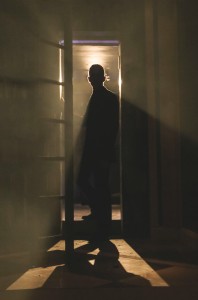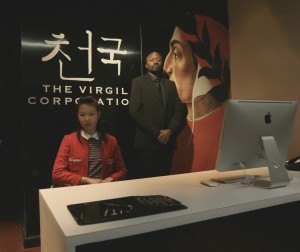You are locked inside the small lobby of a corporate office building with 10 other strangers. An ominous voice on an intercom informs your group that you have one hour to escape. The lights go out. A screen flickers on, flashing random surreal images quicker than your brain can process. A human eye; a girl in a forest; a Romantic painting; an architectural spiral. Everyone panics.
This might sound like a nightmare, but it's actually the beginning of Paradiso Chapter 1, a self-described immersive theatrical escape room experience located in Korea Town. Created by theatrical innovator Michael Counts, Paradiso tries to set itself apart from other New York City escape rooms by incorporating several rooms of immersive theater, live actors, and "existential themes." Despite these claims, however, Paradiso does not escape the genre of escape rooms, which is limited by design.
Originating in the early 2000s, escape rooms have gained popularity in many cities across the world, especially in Asia and the U.S. In New York alone, there are dozens of escape rooms to choose from. The concept is simple, but the design can be very complicated: groups of participants are put inside a room or series of rooms and must solve a gauntlet of puzzles within a set time in order to "escape." Many of these rooms have themes. Paradiso Chapter 1 seems to evoke corporate corruption similar to dystopian film and TV shows like Mr. Robot or V for Vendetta, with scattered references to Dante's Divine Comedy.
The Paradiso experience begins days in advance with a series of cryptic text instructions sent to your personal cell phone. A few hours before, you are instructed to meet at an obscure karaoke bar in K-Town. While this messaging system seemed to work for some participants, for one technical reason or another, several others did not receive correspondence. A set of email instructions advice participants to surrender all of their belongings to storage before the experience, but no such check was mandated (only offered to participants who wanted to shed their bags). This meant that, for better or for worse, our group relied on our cell phones throughout the experience—for illumination, notes, or recording clues or images.
During the experience, actors appear to help or hinder your quest to escape. Sarah Jun, Claire Sanderson, Joe Laureiro, and Brian Alford all manage to develop interesting characters within the confines of the escape room format. It is unclear exactly what is at stake, but it seems as if Virgil Corporation is trying to cover up some secrets hidden within their commercial empire. It is left ambiguous whether any of the characters are sympathetic to Virgil Corporation, or whether they are sincerely trying to help you escape. With such a talented cast at hand, Paradiso might consider developing a clearer storyline and incorporating each actor further into the fabric of the experience, perhaps to develop a storyline and to offer insight into the show's supposed existential themes. Instead, the actors felt more like fancy props, limited to (with the exception of Jun) garbled utterances about clues.
Escape rooms, by nature, are different every time. One may or may not escape, depending on the speed at which their group finds and interprets clues correctly. Paradiso claims to incorporate immersive theater techniques, but do not expect the same level of detail as the exquisitely designed sets of companies like Punchdrunk or Third Rail. These immersive companies take precise care to make sure that every object within the interactive set tells a story. The objects in Paradiso seem more haphazard. Additionally, many immersive theater productions, such as Tony & Tina's Wedding, allow participants to talk to the characters and piece together a narrative through their interactions. However, do not expect to interact meaningfully with the characters as one might in local immersive productions such as Speakeasy Dollhouse or The Grand Paradise Hotel.
Escape rooms are not for everyone, but if you enjoy high-pressure gaming environments, definitely attend Paradiso: Chapter 1. Be aware that the pace is fast, the energy is high, and the rooms can become very hot. If immersive and interactive theater is more your thing, consider skipping this one. Our group was unsuccessful in escaping, and Alford's character booted us to the curb as quickly as Jun's had swept us in. Despite failing, it was a unique experience, and will definitely get your adrenaline going.
The open-ended run of Paradiso: Chapter 1 plays Wednesday–Friday from 6–9:30 p.m., Saturday from 2–9.30 p.m., and Sunday from 2–8:30 p.m., with audiences entering every half hour. Paradiso: Chapter 1 takes place at a secret location in Korea Town that is not unveiled until audiences arrive at a designated meeting point shared when their tickets are booked. Tickets start at $45 and are available via www.paradisoescape.com. Advance booking is required.








